外研版八年级英语上册课件 Module 11 Way of life Unit 2 (共25张PPT)
文档属性
| 名称 | 外研版八年级英语上册课件 Module 11 Way of life Unit 2 (共25张PPT) | 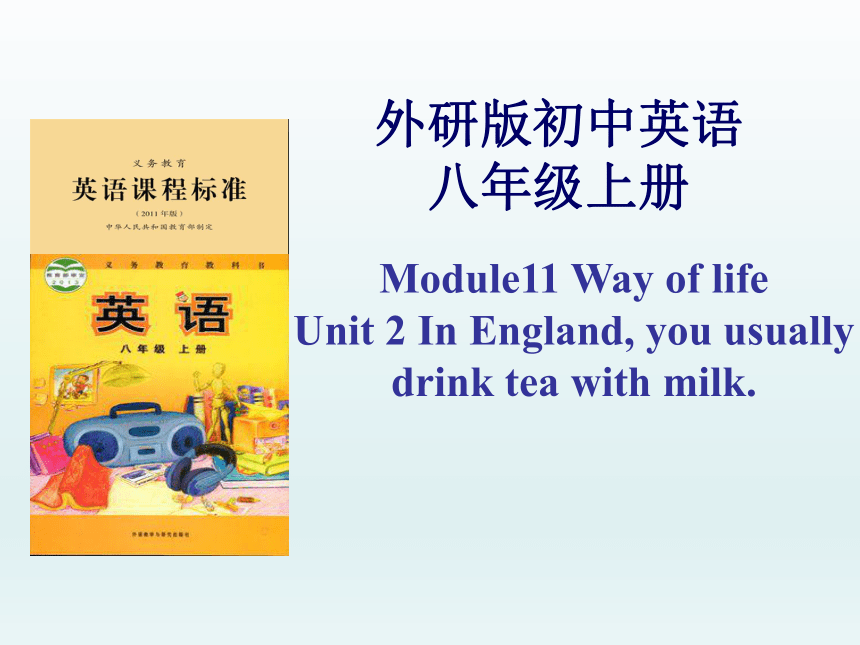 | |
| 格式 | ppt | ||
| 文件大小 | 1.8MB | ||
| 资源类型 | 教案 | ||
| 版本资源 | 外研版 | ||
| 科目 | 英语 | ||
| 更新时间 | 2022-08-03 14:34:29 | ||
图片预览

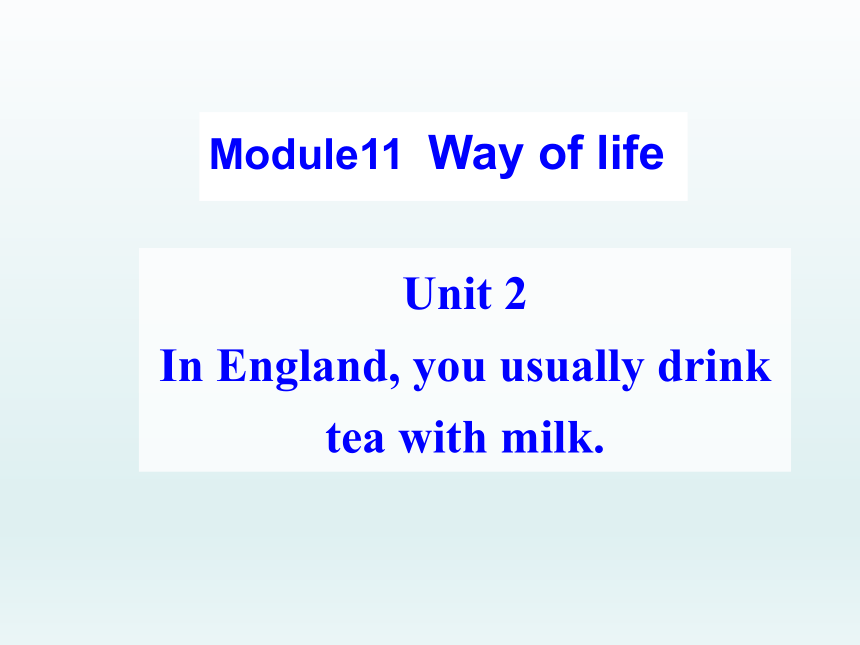

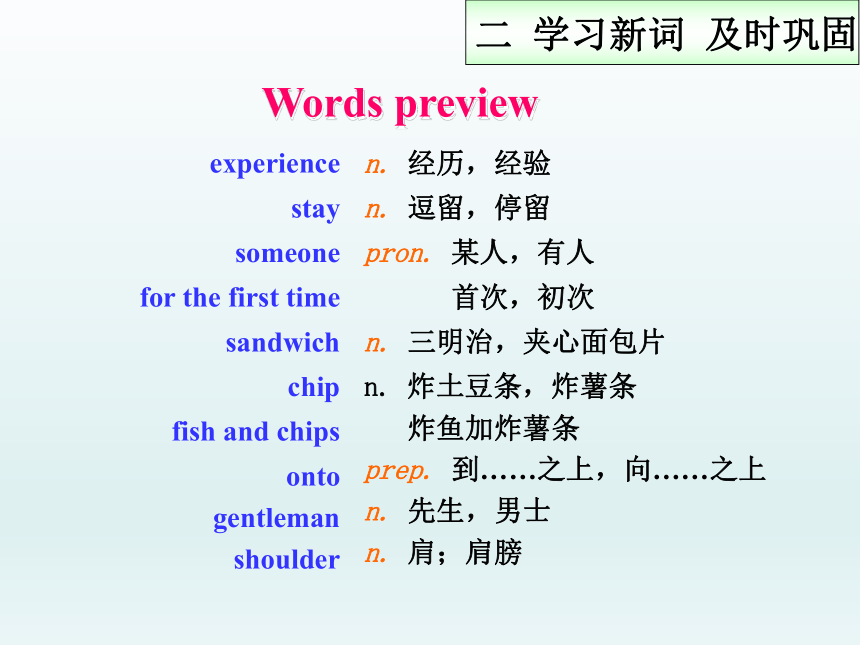


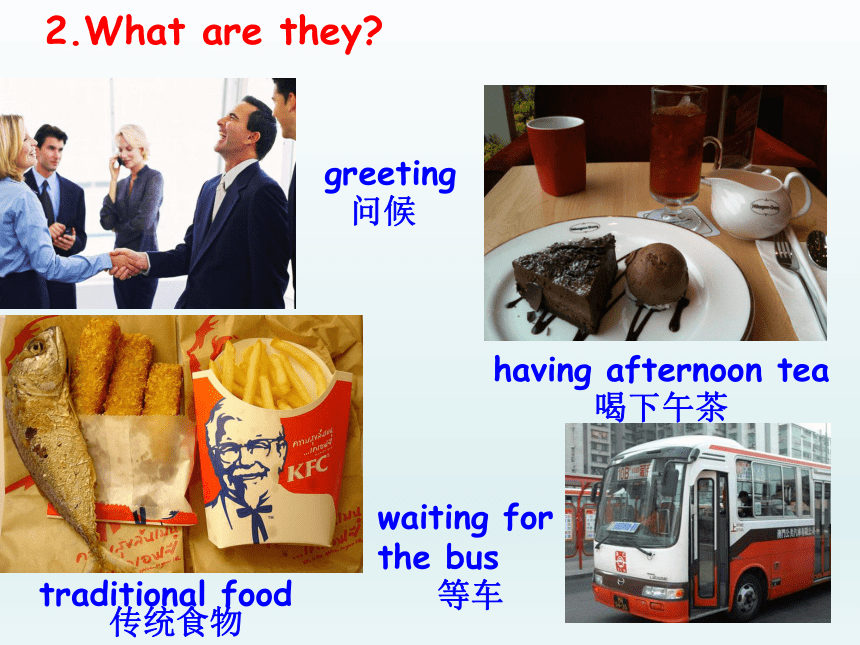
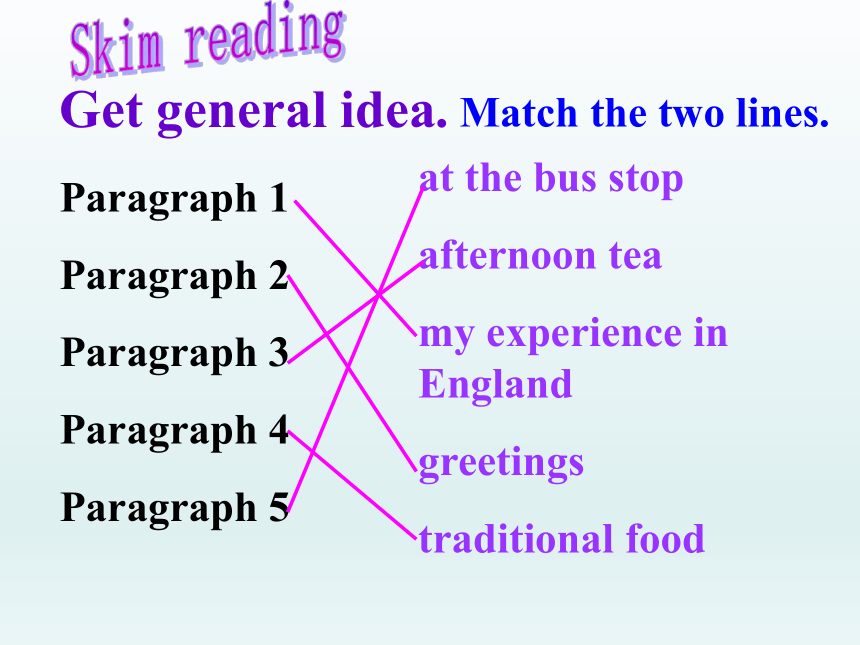
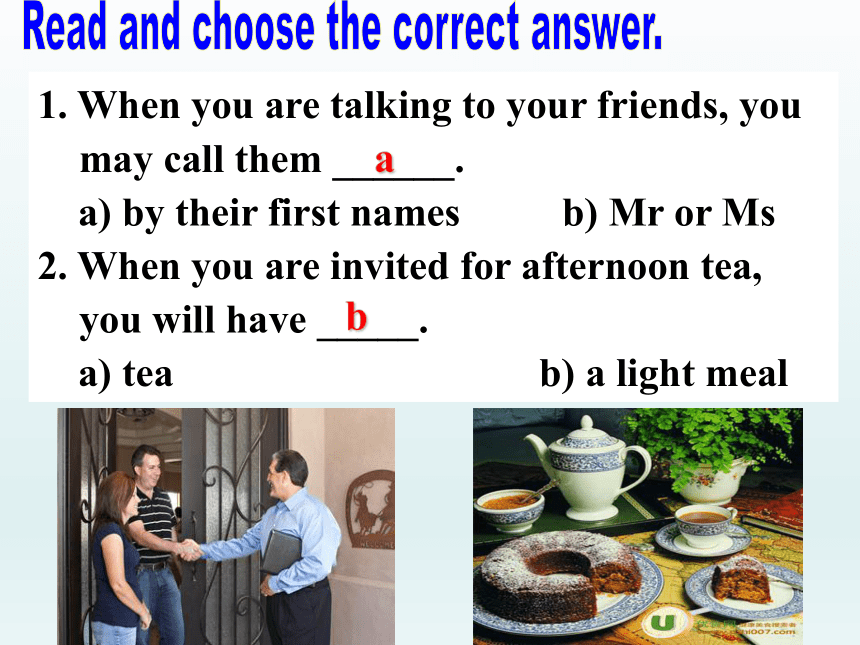
文档简介
(共25张PPT)
Module11 Way of life
Unit 2 In England, you usually drink tea with milk.
外研版初中英语 八年级上册
Unit 2
In England, you usually drink tea with milk.
Module11 Way of life
词汇
功能
教学目标
Module11
Unit 2
语法
experience, stay, someone, gentleman, shoulder, for the first time, fish and chips
情态动词
must, mustn’t,
can, can’t
传统习俗traditions customers
n. 经历,经验
n. 逗留,停留
pron. 某人,有人
首次,初次
n. 三明治,夹心面包片
炸土豆条,炸薯条
炸鱼加炸薯条
prep. 到……之上,向……之上
n. 先生,男士
n. 肩;肩膀
experience
stay
someone
for the first time
sandwich
chip
fish and chips
onto
gentleman
shoulder
Words preview
二 学习新词 及时巩固
I enjoy my s at school.
There is s knocking at the door.
The two girl students talked at the beginning of the term.
G is always polite to others.
He gave me a tap(轻拍) on the s .
Wang Hui often goes to other countries during holiday . He has a lot of e of travelling.
根据首字母和句意补全单词和短语
tay
omeone
for the first time
entleman
houlder
xperiences
Wang Hui’s experiences in England
Watch and answer:
1.How many English ways of life does Wang Hui tell us
There are four.
Fast-reading:
2.What are they
greeting
问候
having afternoon tea
喝下午茶
traditional food
传统食物
waiting for the bus
等车
Get general idea. Match the two lines.
Paragraph 1
Paragraph 2
Paragraph 3
Paragraph 4
Paragraph 5
at the bus stop
afternoon tea
my experience in England
greetings
traditional food
1. When you are talking to your friends, you may call them ______.
a) by their first names b) Mr or Ms
2. When you are invited for afternoon tea, you will have _____.
a) tea b) a light meal
a
b
3. Tea in England usually has ______ in it.
a) milk b) sugar
4. ______ is traditional food in England.
a) Steak and potatoes
b) Fish and chips
5. At the bus stop, it is important that you ______.
a) wait in a line
b) smile politely
a
b
a
四 再读课文 捕捉信息
What did Wang Hui notice when he was in England
Para. One
He noticed something interesting with the English way of life.
Careful-reading:
“有趣的一些事”
修饰不定代词的形容词后置
2. What is one example of the English way of life
Para. Two
You must say Mr. or Mrs. when you meet someone for the first time.
Mr. or Mrs.
Use their first names
David Beckham
When you get to know each other better.
When they ask you to use their first names
逐渐了解
ask sb. to do
Para. Three
having afternoon tea
when
what
how
at around
4 pm
sandwiches and a large fruit cake
drink tea
usually drink
tea with milk
Afternoon tea is not just a ____
but a _______ .
drink
light meal
not just…but..
不仅是…而且是..
一顿简单
的便饭
奶茶
Q:How can you eat fish and chips
Q: What is traditional food in England
Fish and chips
炸鱼加炸薯条
you can eat it in fish and chip shops, or take it away.
Eat it with your fingers
Para. Four
带走,拿走
用手指
Para. Five
Q: What do people do when they wait for the bus
They need to stand in a line and wait for their turn.
push one’s way onto the bus
挤上公交车
上车
拍某人的肩膀
get on the bus
touch sb. on the shoulder
站队,排队
等候顺序
My experience in England
call others
for the first time
know better
/ask you to
have afternoon tea
what
when
how
traditional
food
at the bus stop
mustn't do
need to do
My experience in England
meeting
talk to older /young people
What do you do when you meet for the first time
have afternoon tea
what
when
how
traditional
food
at the bus stop
mustn't do
need to do
五 拓展练习 巩固提高
Tony’s experiences in China
call others
We may shake hands with /smile at each other
Use ”nin”
Call the older
grandpa/grandma
Call the young
their names
drink tea
anytime
with nothing
just drink, don’t eat
serve visitors
give them tea,
fruit and cakes
share one pare
Tony’s feeling about way of life
in China
Tony’s feeling
Meeting
Have tea
Traditional food
manners
They may shake hands with or smile at each other when they meet for the first time. When they meet older people, they must use “nin” to show their respect, and call them grandpa or grandma. They can call the young their names.
People in China are friendly to each other.
Tea in China is just a drink. They usually drink tea after meal, at any time they like. They drink tea with nothing.
The Spring Festival is the biggest festival in China. People must get together and have a big meal with their families. They’ll have lots of dumplings.
when there are visitors at home, they need to give them tea, fruits and cakes to have. But they mustn’t share a pare with the other one. It is bad luck.
Tony’s experiences in China
They may shake hands with or smile at each other when they meet for the first time. When they meet older people, they must use “nin” to show their respect, and call them grandpa or grandma. They can call the young their names.
The Spring Festival is the biggest festival in China. People must get together and have a big meal with their families. They can have lots of dumplings.
Tea in China is just a drink. They usually drink tea after meal, at any time they like. They drink tea with nothing.
when there are visitors at home, they need to give them tea, fruits and cakes to have. But they mustn’t share a pare with the other one. It is bad luck.
词 汇
语 法
课堂小结
experience, stay,
someone, gentleman, shoulder, for the first time, fish and chips
You must say..
You can take it away..
You must not push ..
You need to stand…
功 能
talk about customs/
traditions
六 课堂小结 达标检测
1. You _____ listen to your teacher carefully in class.
2. We ________ cross the road if the traffic is busy.
3. —Where ____ my brother be
— He _____ be in the classroom, because
I saw him in the library just now.
4. Students _______ copy others’ homework.
5. — She ____ speak English.
— So ___ I .
must
mustn’t
can
can’t
mustn’t
can
can
Complete the sentences with can /can’t / must / mustn’t.
Complete the sentences
1.当我第一次做讲演时,我有点紧张。
I was a little nervous when I made a speech
____ ____ _____ ____.
2.你们通常几点钟喝下午茶
What time do you usually_____ ________ _____
3.刘老师不仅仅是一位老师,更是我们的
好朋友
Ms Liu is____ ____ a teacher____ a very
good friend of ours.
for the first time
have afternoon tea
not just but
4.看!天上有些奇怪的东西。
Look! There is________ ________in the sky.
5. —— 您是在这就餐还是带走?
—— 在这吃。
—— would you like to eat in the restaurant or _____ _____
—— I’d like to eat here.
something strange
take away
Homework
Write advice on way of life in your
hometown for foreign visitors.
Using can/ must /need
Thanks for your listening
Module11 Way of life
Unit 2 In England, you usually drink tea with milk.
外研版初中英语 八年级上册
Unit 2
In England, you usually drink tea with milk.
Module11 Way of life
词汇
功能
教学目标
Module11
Unit 2
语法
experience, stay, someone, gentleman, shoulder, for the first time, fish and chips
情态动词
must, mustn’t,
can, can’t
传统习俗traditions customers
n. 经历,经验
n. 逗留,停留
pron. 某人,有人
首次,初次
n. 三明治,夹心面包片
炸土豆条,炸薯条
炸鱼加炸薯条
prep. 到……之上,向……之上
n. 先生,男士
n. 肩;肩膀
experience
stay
someone
for the first time
sandwich
chip
fish and chips
onto
gentleman
shoulder
Words preview
二 学习新词 及时巩固
I enjoy my s at school.
There is s knocking at the door.
The two girl students talked at the beginning of the term.
G is always polite to others.
He gave me a tap(轻拍) on the s .
Wang Hui often goes to other countries during holiday . He has a lot of e of travelling.
根据首字母和句意补全单词和短语
tay
omeone
for the first time
entleman
houlder
xperiences
Wang Hui’s experiences in England
Watch and answer:
1.How many English ways of life does Wang Hui tell us
There are four.
Fast-reading:
2.What are they
greeting
问候
having afternoon tea
喝下午茶
traditional food
传统食物
waiting for the bus
等车
Get general idea. Match the two lines.
Paragraph 1
Paragraph 2
Paragraph 3
Paragraph 4
Paragraph 5
at the bus stop
afternoon tea
my experience in England
greetings
traditional food
1. When you are talking to your friends, you may call them ______.
a) by their first names b) Mr or Ms
2. When you are invited for afternoon tea, you will have _____.
a) tea b) a light meal
a
b
3. Tea in England usually has ______ in it.
a) milk b) sugar
4. ______ is traditional food in England.
a) Steak and potatoes
b) Fish and chips
5. At the bus stop, it is important that you ______.
a) wait in a line
b) smile politely
a
b
a
四 再读课文 捕捉信息
What did Wang Hui notice when he was in England
Para. One
He noticed something interesting with the English way of life.
Careful-reading:
“有趣的一些事”
修饰不定代词的形容词后置
2. What is one example of the English way of life
Para. Two
You must say Mr. or Mrs. when you meet someone for the first time.
Mr. or Mrs.
Use their first names
David Beckham
When you get to know each other better.
When they ask you to use their first names
逐渐了解
ask sb. to do
Para. Three
having afternoon tea
when
what
how
at around
4 pm
sandwiches and a large fruit cake
drink tea
usually drink
tea with milk
Afternoon tea is not just a ____
but a _______ .
drink
light meal
not just…but..
不仅是…而且是..
一顿简单
的便饭
奶茶
Q:How can you eat fish and chips
Q: What is traditional food in England
Fish and chips
炸鱼加炸薯条
you can eat it in fish and chip shops, or take it away.
Eat it with your fingers
Para. Four
带走,拿走
用手指
Para. Five
Q: What do people do when they wait for the bus
They need to stand in a line and wait for their turn.
push one’s way onto the bus
挤上公交车
上车
拍某人的肩膀
get on the bus
touch sb. on the shoulder
站队,排队
等候顺序
My experience in England
call others
for the first time
know better
/ask you to
have afternoon tea
what
when
how
traditional
food
at the bus stop
mustn't do
need to do
My experience in England
meeting
talk to older /young people
What do you do when you meet for the first time
have afternoon tea
what
when
how
traditional
food
at the bus stop
mustn't do
need to do
五 拓展练习 巩固提高
Tony’s experiences in China
call others
We may shake hands with /smile at each other
Use ”nin”
Call the older
grandpa/grandma
Call the young
their names
drink tea
anytime
with nothing
just drink, don’t eat
serve visitors
give them tea,
fruit and cakes
share one pare
Tony’s feeling about way of life
in China
Tony’s feeling
Meeting
Have tea
Traditional food
manners
They may shake hands with or smile at each other when they meet for the first time. When they meet older people, they must use “nin” to show their respect, and call them grandpa or grandma. They can call the young their names.
People in China are friendly to each other.
Tea in China is just a drink. They usually drink tea after meal, at any time they like. They drink tea with nothing.
The Spring Festival is the biggest festival in China. People must get together and have a big meal with their families. They’ll have lots of dumplings.
when there are visitors at home, they need to give them tea, fruits and cakes to have. But they mustn’t share a pare with the other one. It is bad luck.
Tony’s experiences in China
They may shake hands with or smile at each other when they meet for the first time. When they meet older people, they must use “nin” to show their respect, and call them grandpa or grandma. They can call the young their names.
The Spring Festival is the biggest festival in China. People must get together and have a big meal with their families. They can have lots of dumplings.
Tea in China is just a drink. They usually drink tea after meal, at any time they like. They drink tea with nothing.
when there are visitors at home, they need to give them tea, fruits and cakes to have. But they mustn’t share a pare with the other one. It is bad luck.
词 汇
语 法
课堂小结
experience, stay,
someone, gentleman, shoulder, for the first time, fish and chips
You must say..
You can take it away..
You must not push ..
You need to stand…
功 能
talk about customs/
traditions
六 课堂小结 达标检测
1. You _____ listen to your teacher carefully in class.
2. We ________ cross the road if the traffic is busy.
3. —Where ____ my brother be
— He _____ be in the classroom, because
I saw him in the library just now.
4. Students _______ copy others’ homework.
5. — She ____ speak English.
— So ___ I .
must
mustn’t
can
can’t
mustn’t
can
can
Complete the sentences with can /can’t / must / mustn’t.
Complete the sentences
1.当我第一次做讲演时,我有点紧张。
I was a little nervous when I made a speech
____ ____ _____ ____.
2.你们通常几点钟喝下午茶
What time do you usually_____ ________ _____
3.刘老师不仅仅是一位老师,更是我们的
好朋友
Ms Liu is____ ____ a teacher____ a very
good friend of ours.
for the first time
have afternoon tea
not just but
4.看!天上有些奇怪的东西。
Look! There is________ ________in the sky.
5. —— 您是在这就餐还是带走?
—— 在这吃。
—— would you like to eat in the restaurant or _____ _____
—— I’d like to eat here.
something strange
take away
Homework
Write advice on way of life in your
hometown for foreign visitors.
Using can/ must /need
Thanks for your listening
同课章节目录
- Module 1 How to learn English
- Unit 1 Let's try to speak English as much as possi
- Unit 2 You should smile at her.
- Unit 3 Language in use .
- Module 2 My home town and my country
- Unit 1 It's taller than many other buildings.
- Unit 2 Cambridge is a beautiful city in the east o
- Unit 3 Language in use .
- Module 3 Sports.
- Unit 1 Nothing is more exciting than playing tenni
- Unit 2 This year we training more carefully.
- Unit 3 Language in use .
- Module 4 Planes, ships and trains .
- Unit 1 He lives the farthest from school.
- Unit 2 What is the best way to travel.
- Unit 3 Language in use .
- Module 5 Lao She Teahouse.
- Unit 1 I wanted to see the Beijing Opera.
- Unit 2 It descibes the changes in Chinese society.
- Unit 3 Language in use .
- Module 6 Animals in danger.
- Unit 1 It allows people to get closer to them .
- Unit 2 The WWF is working hard to save them all.
- Unit 3 Language in use .
- Revision module A
- Module 7 A famous story
- Unit 1 Alice was sitting with her sister by the ri
- Unit 2 She was thinking about her cat.
- Unit 3 Language in use .
- Module 8 Accidents
- Unit 1 While the car were changing to red, a car s
- Unit 2 I was trying to pick it up when it bite me
- Unit 3 Language in use .
- Module 9 Population
- Unit 1 The population of China is about 1.37 billi
- Unit 2 Arnwick was a city with 200,000 people.
- Unit 3 Language in use .
- Module 10 The weathe
- Unit 1 It might snow.
- Unit 2 The weather is fine all year round.
- Unit 3 Language in use .
- Module 11 Way of life
- Unit 1 In China ,we open a gift later.
- Unit 2 In England, you usually drink tea with milk
- Unit 3 Language in use .
- Module 12 Help
- Unit 1 What should we do before help arrives?
- Unit 2 Stay away from windows and heavy furniture.
- Unit 3 Language in use .
- Revision module B
